Search
Showing 10 of 1193 results for Value-priced treatments https://simplemedrx.top
-
Applications for the 2024 PPP New Zealand-German academic exchange programme are now open!
An information session is being held on Tuesday 23 April and is open to all New Zealand and German academics (graduates, doctoral candidates, doctorate holders, professors and lecturers). Click here to register for the information session and click here for more information on the PPP programme.
Please share this information with your networks.
-
ENZ Agent Seminars in China make a strong impact for rebuilding connections
China is the largest source of international students for New Zealand with agents being the leading channel for student recruitment in this market. Building strong connections between providers and agents in China is critical to recovering student mobility, improving awareness of New Zealand as a study destination and strengthening New Zealand's market position. ENZ's Agent Seminars in China are a well-recognised and impactful way of building relationships with a range of key agents.
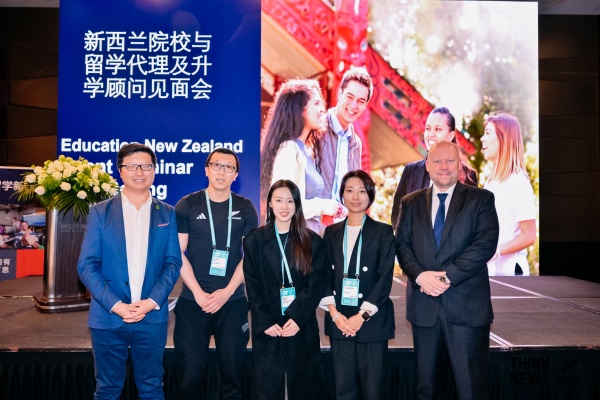
Education Counsellor and ENZ’s Regional Director Greater China, Michael Zhang, (far left) at the Beijing Agent Seminar with representatives from New Oriental Education Agency and H.E. Grahame Morton, New Zealand Ambassador to People’s Republic of China.
In addition, Agent Seminars also help to keep agents informed with the latest official information and is an important tool that Education New Zealand Manapou ki te Ao (ENZ) and other NZ Inc agencies use to share such information. According to recent Immigration New Zealand (INZ) data, agents in China have a high approval rate for student visa processing.
Currently, ENZ runs its Agent Seminar series twice a year in this region and this latest series of events held in Chengdu, Shanghai, Hong Kong and Beijing were supported by the New Zealand Ministry of Foreign Affairs and Trade (MFAT) and INZ. INZ’s China-based representatives gave in-person presentations, an initiative which was well received with 88% of agents reporting its inclusion as “very or extremely important to their attendance” in a post-event survey.
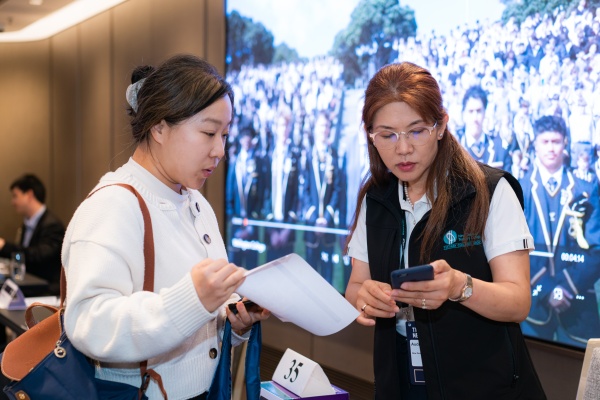
Participants at the Hong Kong Agent Seminar discuss New Zealand education offerings.
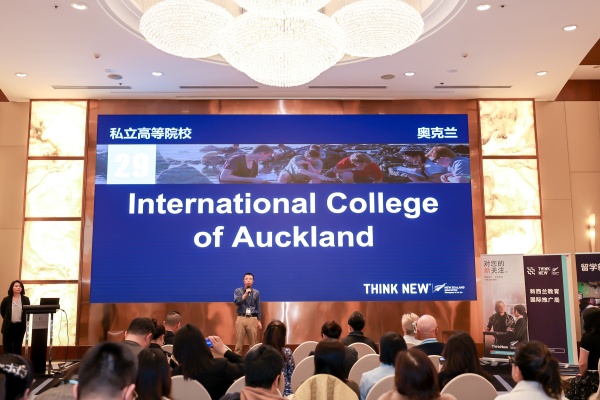
Kevin Wang from the International College of Auckland presenting at the Shanghai Agent Seminar.
To leverage the visibility of New Zealand education providers in the China market, ENZ facilitated media interviews and social media recordings for participants at the Shanghai and Chendgu Seminars. New Zealand providers and ENZ representatives in Chengdu conducted interviews with 13 journalists, the highest response rate for media attending Agent Seminars to date. As a result, three million views were achieved from 58 stories published by 27 local media outlets, with New Zealand university representatives quoted in a media story and an exclusive interview and story for Te Pūkenga on the uniqueness of New Zealand's vocational education in a separate article.
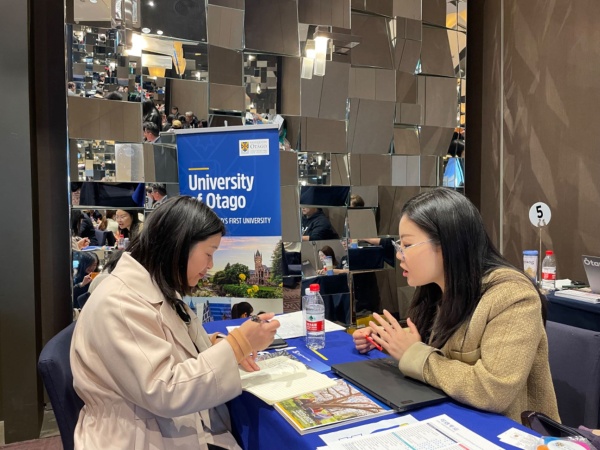
Joyce Zhang, University of Otago, is interviewed by a journalist from local media in Chengdu at the ENZ Agent Seminar.
In Shanghai, the ENZ Shanghai team delivered a China marketing insights session for sector representatives. The presentation titled “Unlocking China’s Education Market: Insights and tools for success” covered:
-
The key drivers of the consumer
-
China’s media/digital/social media landscape
-
The big four – WeChat, Little Red Book, Douyin and Bilibili (case studies included)
-
ENZ’s China local marketing plan.
Anyone interested in receiving a copy of the Marketing Presentation can access this here on ENZ’s Intellilab.
ENZ collaborated with Shinyway, the largest agent in the eastern region of China to produce short videos for the agency to promote online. The online promotion aimed to leverage brand awareness of a New Zealand education showcasing New Zealand providers attending the Shanghai event. A big kudos goes to the 18 brave New Zealand representatives who accepted the invitation to participate in the filming. Education Counsellor and Regional Director Greater China, Michael Zhang, was also interviewed to present the advantages of a New Zealand education and our institutions across all sectors.
Shinyway has published all the videos on their consumer-facing social media platforms, including WeChat, Little Red Book, and Weibo. The collaboration enhances New Zealand providers’ market exposure by leveraging Shinyway's influence across their digital platforms and reaching prospective audiences in China elevating our brand profile within a highly targeted audience group.
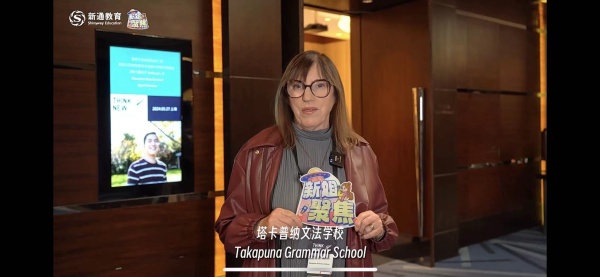
Mary Nixon, Principal of Takapuna Grammar School participating in the recording for sharing on social media. The first trial video published on Shinyway's WeChat received over 300 engagements including likes, shares, favorites and comments.
87.5% of New Zealand education providers also said that “attendance at the seminars was either “very valuable” or “valuable” for their organisation.”
The dates and locations for the next round of Agent Seminars in China will be announced soon. These details will be posted on the ENZ Events page along with the link for registering.
-
-
Message from Minister for Tertiary Education and Skills, Penny Simmonds
It’s good to reflect on ENZ’s New Zealand International Education Strategy (NZIES), “to enable a thriving and globally connected New Zealand through world-class international education.”
I am delighted to say that with the increase in the numbers of overseas students we are on track to deliver on that strategy.
There have been 59,306 international student enrolments for Jan - August 2023, a 43% increase compared to the full year in 2022.
And New Zealanders' understanding of the economic and social benefits of international students was reflected in a survey late in December 2023 by Ipsos which showed 75% percent of New Zealanders believe that overseas students benefit New Zealand. This is up from 47% in 2019.
An increase in the number of international students from all over the world is positive as it brings in vital revenue for institutions and the country, but it also has the spinoff of creating a wonderful cosmopolitan element to campus life.
New Zealand is a small country and for many students, rubbing shoulders with people from other cultures will give them a greater understanding of the issues facing our complex world. In this time of fragile geopolitics, the melting pot of campus life can help build greater understanding and tolerance.
In turn Kiwi students also can be champions for our own country as they share their knowledge, experience and friendship with the overseas students.
The quality education that our institutions provide also enhances our global society by upskilling and educating all students to take on international work opportunities which inevitably spreads New Zealand’s values and influence throughout our world.
Hon Penny Simmonds
Minister for Tertiary Education and Skills -
Insights Accelerator - 3 things for 30 minutes for PTE and ELS providers
The goal of the Insights Accelerator sessions is to offer concise information and insights to support our PTE and ELS providers. By focusing on three things within 30 minutes, Education New Zealand Manapou ki te Ao (ENZ) hopes to efficiently deliver useful takeaways while being mindful of busy schedules.
ENZ’s General Manager, Sector Engagement and Innovation, Wendy Kerr said that two Insights Accelerator sessions have been held so far and were well received by attendees.
“My team is constantly reviewing ways we can better engage with the sector and add greater value. With this platform, we hope that we can support providers in their strategic planning endeavours through the sharing of useful information about our services, as well as market insights.
“These sessions also provide an avenue for us to understand more about our customers. We will be hosting more of these sessions in the coming months so please keep an eye out for the invitation”, added Wendy.
For the launch session, Nick Sinclair, ENZ’s Global Brand Manager presented on the international advertising campaign: Learn New Every Day, and talked about the campaign rationale, channels and target markets, and campaign assets as well as where and how the sector can use these.
In the second Insights Accelerator, ENZ’s Director Insights Marie Clark presented information on ENZ Intellilab, including 2023 Ministry of Education Student Enrolment Data. Marie shared how providers can access Intellilab and the range of information available. The session also looked at the survey findings from the 2023 New Zealanders’ perceptions of the value of international education research and 2023 International Students Experience research.
If anyone missed the sessions, the slide pack and presentation can be accessed via the links below.
For further information, please contact Jane Yang, ENZ Business Development Manager – jane.yang@enz.govt.nz
-
Latest Immigration New Zealand update: English translations will be required for visitor visa suppor
English translations will be required for visitor visa supporting documents
Immigration New Zealand (INZ) has announced that from 17 June 2024, all supporting documents submitted with visitor visa applications to INZ must be provided in English. This includes visitor visa applications from people wanting to study for less than three months.
For further information on what this means please see the announcement on the INZ website: English translations will be required for visitor visa supporting documents | Immigration New Zealand.
There are no plans at this stage for student visas to follow suit.
-
New Zealand teens rank among the best for creative thinking
New Zealand is the among highest-performing education systems for creative thinking, ranking fifth in the world out of 81 countries, with an average score of 36 points per student that is higher than the OECD average of 33 points.
Education New Zealand Manapou ki te Ao Acting Chief Executive, Dr Linda Sissons said she was delighted to see New Zealand students stand out globally for creative thinking.
“New Zealand classrooms adopt a hands-on, practical approach to learning that encourages students to express their ideas, and to think critically and collaboratively.
“Creative thinking is a valuable quality that also enriches the outputs of a wide range of tertiary and career fields, from arts, engineering, technology and biomedicine to infrastructure and mathematics.
“We are pleased to see this approach endorsed in the latest PISA tests,” Dr Sissons said.
The PISA 2022 creative thinking data provides insights into how well education systems are preparing students to think outside the box in different contexts. This was the first time that the PISA test measured the ability of students to demonstrate creativity, specifically their ability to come up with original and diverse ideas.
Between 60-70 percent of students across participating OECD countries also reported that their teachers value their creativity, that they encourage them to come up with original answers, and that they are given a chance to express their ideas in school.
For further information:
Sai Raje | Senior Communications Advisor, Education New Zealand Manapou ki te Ao+64 21 479 649
Notes to Editors:
About Education New Zealand Manapou ki te Ao (ENZ) https://www.enz.govt.nz/ENZ is the government agency dedicated to helping Aotearoa New Zealand realise the social, cultural, and economic benefits of international education. Our role is to promote New Zealand as a high-quality education destination offering excellent education and students experiences and to encourage New Zealand students to study overseas.
With approximately 110 staff in 16 locations around the world, ENZ works closely with New Zealand’s diverse education sector which includes schools, English language providers, Private Training Establishments, Institutes of Technology and Polytechnics (Te Pūkenga), and universities. Internationally, we work with a range of education stakeholders, including government agencies and education providers to identify and encourage sustainable growth opportunities for New Zealand’s education sector.
-
From the Acting CE: Forward together
Tēnā koutou katoa
Last week we took time internally to reflect on our work over the 2023/24 financial year. So much excellent work has happened over the past twelve months – it was wonderful to come together virtually as an organisation to celebrate the achievements.
There are good reasons to celebrate. International students are returning to New Zealand. The latest enrolment figures show that there were 69,135 international student enrolments with New Zealand education providers in 2023. This represents a 67 per cent increase compared to the full year in 2022 and 60 per cent of annual enrolments in 2019.
This is positive news for our education sector and good for our communities.
A key part of our strategy is to partner and connect and to be an enabler of international education for New Zealand, so I thought I would share with you some recent engagements with that in mind.
This past month I had the pleasure of speaking at the opening plenary session of the annual SIEBA (Schools International Education Business Association) conference in Auckland. The theme of the hui was Global Threads Local Ties. The school sector is very important to New Zealand’s international education offering. It is the second largest sub sector after universities, representing about 20 percent of the value of our entire industry and it is where we find the highest economic value and the greatest opportunity to pathway through to other New Zealand providers.
Likewise, in early August I was pleased to welcome to our Wellington office a delegation of twenty indigenous students visiting from the University of Toronto. Canada is one of New Zealand’s closest and longstanding international partners and it is pleasing to see indigenous-to-indigenous cooperation between both countries increasing. We are really noticing growing interest in this overseas as you will read in this article here. - Indigenous Internationalisation a hot topic
Turning our attention to the next 12 months, in June the ENZ Board approved our business plan for this financial year (1 July 2024 to 30 June 2025). The plan has four clear priorities:
-
To grow and diversify the number and value of international students studying with New Zealand
-
Partner and connect to be the trusted voice and enabler of international education for New Zealand
-
To deliver sector growth through services that are valued by the sector, international students and New Zealand Inc partners, and
-
Optimise ENZ to be a more efficient and effective Crown Agency.
When it comes to delivering valued sector services, the upcoming New Zealand International Education Conference (NZIEC KI TUA) in August will be provide an excellent opportunity to come together as a sector to listen, learn, discuss, contribute, and network with specialists and colleagues.
If you haven’t yet registered, I encourage you to check out the conference website. This year it will be held from 6 to 8 August 2024 at Tākina Convention Centre in Wellington.
We have a stellar line up of speakers and it promises to be an engaging and informative event.
Whaowhia te kete mātauranga
Fill the basket of knowledge.
Ngā mihi nui,
Dr Linda Sissons
Acting Chief Executive
Education New Zealand Manapou ki te Ao
-
-
INZ student visa update: July 2024
Visa processing update (as at 10 July 2024).
Since January 2024, Immigration New Zealand (INZ) has received 24,541 student visa applications from international students outside of New Zealand. INZ have completed 20,369 of these applications, with 15,242 approved.
Recent processing times for international student visa applications are published on the INZ website and are updated by month: Visa processing times for international students
Work rights available for more partners of students
In June, the Government expanded the eligibility for work visas for partners of some students studying towards a Green List occupation.
People can now apply for a Partner of Student Work Visa, with open work rights, if their partner is studying a specified level 7 or 8 bachelor’s or bachelor’s (honours) degree that will lead directly to professional registration required for a Green List role.
This relates to Green List roles where occupational registration, rather than qualification requirements, are specified, such as nurses, doctors, and teachers.
For people granted a Partner of Student Work Visa, any school-aged dependents they have will be considered domestic students for tuition fee purposes and can apply for a Dependent Child Student Visa.
End of year student visa peak – Apply early!
The processing of international student visas is a key focus for INZ, particularly as we get closer to the end of the year.
INZ receives the highest volumes of student visa applications between October and March. Applications generally take longer to be decided during this peak period, so it is important that anyone who is wanting to come to New Zealand to study next year applies early. It is recommended students apply three months before their intended travel date to give them the best chance of having their application decided in time.
There are a few things applicants can do to make sure their application is able to be processed as quickly as possible. These include:
-
Check out INZ’s student visa information sheet on the INZ website to make sure a good quality application is submitted that includes all the evidence and supporting documents we need to decide the application. INZ will not be contacting applicants to ask for more information during the peak processing period, so it is important that everything is included from the start.
-
Applicants must demonstrate that they can comfortably afford to study in New Zealand. New Zealand has a thorough funds assessment and INZ looks for genuine sources of funds that are credible and can be verified. If INZ cannot verify funds or is not satisfied that any verification would be genuine, then the application will be declined.
-
INZ is seeing decline rates for international student visas increasing for many markets due to the increase in applications that cannot meet immigration requirements, so make sure the requirements are fully understood before submitting an application.
-
-
ENZ roadshow heading to South America in 2025!
The South American region has significant potential to grow international student numbers to New Zealand. ENZ is excited to help facilitate this growth with a series of agent-facing events in Bogota, Colombia, São Paulo, Brazil, and Santiago, Chile.
Representatives from all New Zealand's education subsectors are invited to participate, with New Zealand Private Training Establishments (PTEs) and English Language Schools (ELS) particularly encouraged, seeing as both subsectors have been identified as having significant opportunities for growth in this region in ENZ's 2024/25 Business Plan.
The events offer New Zealand providers the opportunity to deliver presentations to local education agents, meet with them one-on-one, and network at a closing function.
ENZ's Director of Engagement for Latin America, Javiera Visedo, said that these seminars will offer a great opportunity for New Zealand institutions to reconnect with high performing South American education agents.
“In 2023, we had 3,124 students from Latin America studying in New Zealand which is a 68% increase from 2022 but a long way off pre-Covid levels,” said Javiera.
She added “in organising this series of events for early next year, we want to to keep facilitating the ongoing connection of New Zealand’s providers with key agents in the region, putting New Zealand front of mind as they assist students in their international study decision making processes".
Any education providers who are interested in receiving more information about the events and register to attend, can do so here - https://enzevents.eventsair.com/EduNZ/2025-south-america-roadshow/info.
-
Māori and First Nations people connect during University of Toronto visit
18 indigenous students and two indigenous staff from the University of Toronto’s ‘First Nations House’ were invited to Aotearoa New Zealand for a week-long visit at Tirorangi Marae at the base of Mount Ruapehu in July.
The purpose of the visit was to enhance cross-cultural understanding between Māori and First Nations and Métis peoples and is significant as empowering iwi and hapū in the international education space is an important Te Tiriti obligation for ENZ, as an Aotearoa New Zealand government agency.
The visit took place during the time of ‘Puanga’ which is when the single star rises higher in the sky than the Matariki star cluster and is recognised by iwi and hapū that can’t see the Matariki cluster from their location.
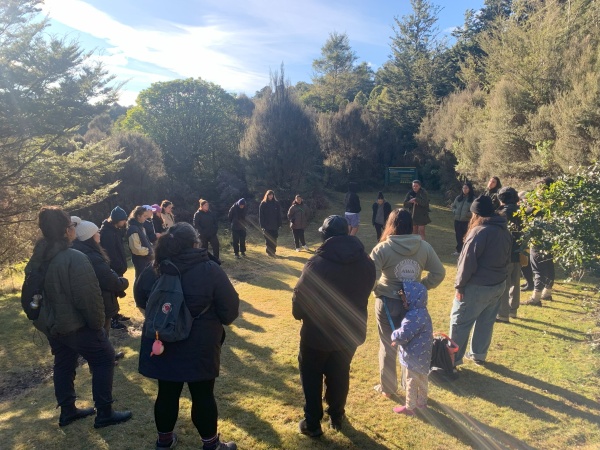
Māori and First Nations and Métis people have ’sharing circles’ as a common way to teach and learn.
The group participated in a wide range of activities in the area while staying at the marae. They were then welcomed to Te Whanganui-a-Tara by the ENZ Wellington office, visiting Te Tiriti o Waitangi at Archives New Zealand Te Rua Mahara o te Kāwanatanga and and Te Herenga Waka — Victoria University of Wellington, before finishing their trip in Whakatū (Nelson) with some adventure tourism activities.
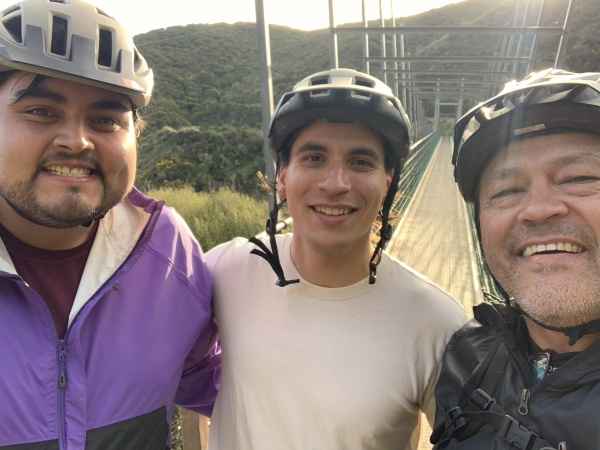
Indigenous students Kieren and Bailey from the University of Toronto sampling Wellington’s outdoors with ENZ's Craig Rofe.
The First Nations and Métis members of the group experienced what living on a marae was like and were also immersed in how a tribe engages with the environment, and how iwi businesses, local council and government agencies such as the Department of Conservation (DOC) operate in the field with iwi partnership.
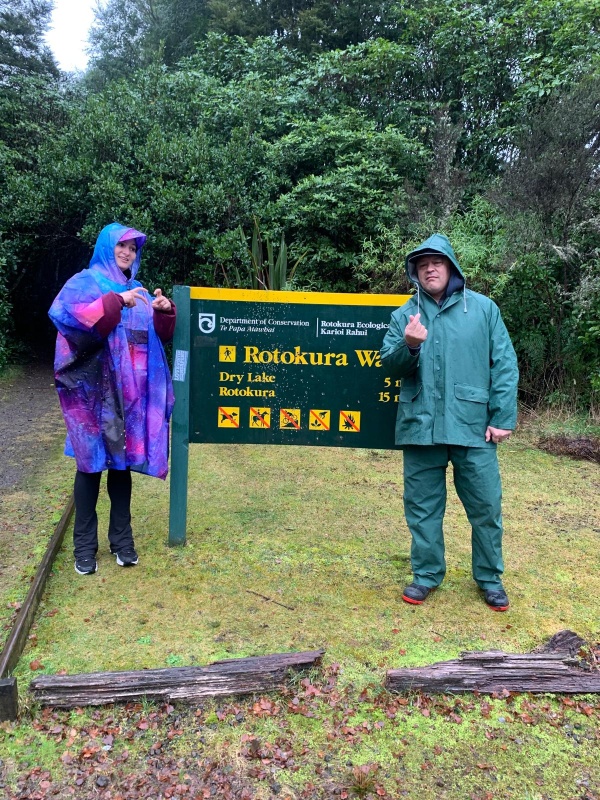
Iwi people sharing lake Rotokura’s healing power, a wāhi tapu (sacred place) for the local tribe.
Dr Craig Rofe, ENZ’s Kaitohutohu Matua Māori – Senior Advisor Māori, said that during the visit, Māori and First Nations and Métis people were able to compare the similarities and differences of their contexts to grow understand of their respective challenges and successes.
“The First Nations people’s struggles to overcome racism and prejudice resonated with tangata whenua, in particular the intentional elimination of language and the current mechanisms of revitalisation.
“Many stories shared with together showed the everyday trauma that resides in each of us and how, as indigenous people, we try to navigate these obstacles to make a better world for the next generation”, said Dr Rofe.
The trip motivated the students to connect more with their languages and culture upon their return.
Kenzie, from the Mohawk tribe said “when we meet again, I’ll be able to talk to you in my language, I’m declaring it!”.
Katherine from the Eskasoni First Nation tribe said “My experience connecting with the Ngāti Rangi revealed the transformative power of global Indigenous connections. Participating in ceremonies such as Hautapu and visiting Mount Ruapehu was particularly moving. Listening to their stories of ancestral ties to the land and taking part in traditional ceremonies that emphasized community and connection to the environment deepened my own personal understanding. This experience inspired me to initiate conversations with elders in my own community about our traditional land management practices.”
This experience also highlights the important offerings that Māori, and indeed indigenous knowledge, has to offer to international education. In particular, and not exclusively, the deep connection that indigenous peoples have with the environment and therefore natural obligation of care.

First Nation student, Alexis, discovers the origins, medicinal, spiritual and mechanical properties of harakeke (flax).
Sustainable practices and programmes can benefit from indigenous inclusion and perspectives, especially with the large-scale impacts of global warming and general pollution in many countries. The co-governance structure that Ngāti Rangi iwi and DOC work with as part of post Te Tiriti Settlement was used as an example of decolonised solutions within our New Zealand context.
There have been discussions between ENZ, Ngāti Rangi iwi, and the University of Toronto about an ongoing relationship and considering what a reciprocal engagement might look like moving forward.
Nāku te ika i hī, nāku anō i whakatau
Ki te haere, whāia i te Pare-i-te-taitonga, tērā taku ika.
This is a Ngāti Rangi iwi reference to the Ruapehu mountain being the ‘pillar post’ of the ‘Fish’ (North Island).

